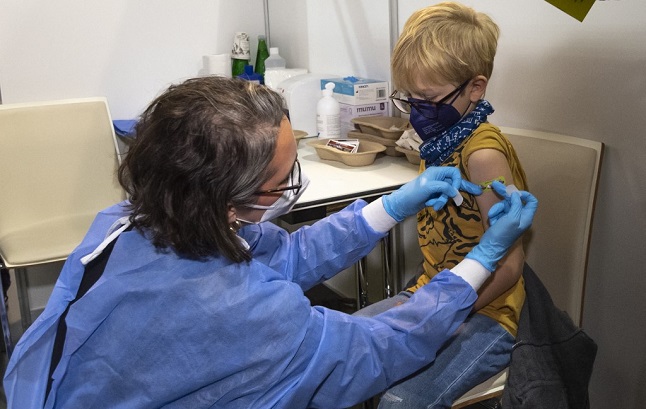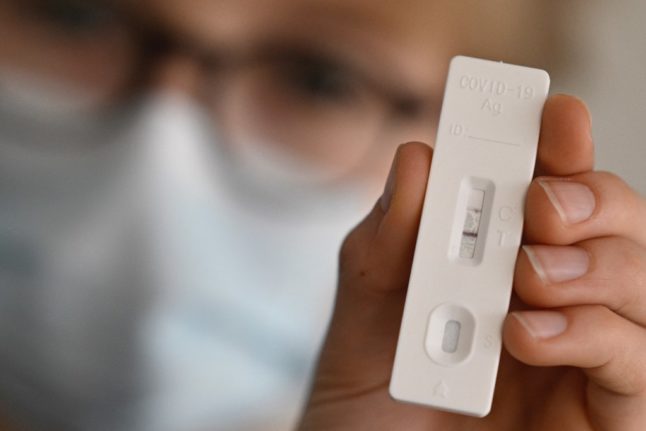Last week, Austria became the first country in Europe to make the Covid-19 vaccination mandatory for everyone.
The announcement of Impfpflicht (compulsory vaccination) has since resulted in protests across the country, as well as an increase in the number of people receiving a first dose of the vaccine.
It has also left many Austrian residents with questions, such as from what age will the vaccination be mandatory? How will Impfpflicht be enforced? And what will happen if someone refuses to be vaccinated?
Here’s what you need to know.
What does Impfpflicht mean?
Despite the Austrian Federal Government repeatedly saying the Covid-19 vaccine will remain voluntary, the announcement of Impfpflicht means that from February 1st 2022 everyone in Austria will have to be vaccinated against Covid-19.
It is unclear whether the proposed law will apply only to Austrian citizens or to foreign residents as well. And there are still questions surrounding the vaccination status of tourists once the law comes into effect.
Additionally, there are plans to update the Green Pass from February, according to ORF.
This means once seven months have passed from the second dose of the vaccination, people will no longer be able to access places that require proof of 2G (vaccinated or recovered) until they have received the third dose.
FOR MEMBERS: Is it possible to travel to Austria during the new Covid lockdown?
Figures show just 65.7 percent of the Austrian population is currently fully vaccinated against Covid-19.
In recent days the number of people that have received at least one dose has risen to 70 percent, but vaccination rates in Austria are still one of the lowest in Europe.
To compare, the vaccination rate in the UK is 68.7 percent, in Germany it is 68 percent and in Spain it is 79.3 percent.
Is Impfpflicht legal?
The big question surrounding the proposed Covid-19 vaccine mandate is whether it is actually legal in Austria.
Professor Karl Stöger from the University of Vienna told The Local it is possible for the Austrian Federal Government to pass the law in Parliament, as long as there is a majority vote of 50 percent in favour.
Then there is the issue of Article 8 on the European Convention of Human Rights that provides a right to respect for one’s “private and family life, his home and his correspondence”.
However, Stöger said a government can infringe on this law if there are compelling reasons to do so.
Stöger told The Local: “If you wish to enact such a measure it has to be proportionate and compulsory vaccination is a measure of last resort if other alternatives are not available or have been exhausted.
“Our health system is over-burdened and it probably won’t cease in a few weeks, but vaccination is the instrument to stop this.
“This makes it proportionate because the negative side effects of the pandemic – economic and social – are devastating. Vaccination is efficient and effective; this is what the medical experts tell us.”
From what age could Impfpflicht apply?
The government hasn’t announced from what age vaccination could be compulsory, but legal experts say it is constitutionally possible for children to be included.
Professor Bernd-Christian Funk from Johannes Kepler University in Linz told The Local: “Children can be included in the vaccination requirement if it turns out to be absolutely necessary for the active or passive protection of the population.
READ MORE: ‘An uncomfortable Christmas’: When will Austria’s Covid lockdown end?
“There have been, and still are, numerous examples of vaccination of children, such as smallpox vaccination or vaccinations against tuberculosis and polio.”
Stöger agrees but says it would be safer to introduce the mandate for people from the age of 18 due to the current data available on the effects of the vaccine.
Stöger said: “For those between the ages of 12 and 18 we now have some experience and data [about the vaccine], but it depends on the medical judgement.
“Children will probably be to last to the be included in the law, but that is a guess.”
How could the law be enforced and what will be the punishment be?
It has not been confirmed how mandatory vaccination could be enforced, but there are reports in the Austrian media that punishment for failing to take the Covid-19 vaccination could result in fines of €3,600 or imprisonment.
However, in a BBC interview, Chancellor Alexander Schallenberg (ÖVP) said there will only be financial penalties (administrative, not criminal) for people that refuse to get vaccinated against Covid-19, not prison sentences.
Schallenberg said: “It’s about showing the people this is serious. This is something they really have to think about.”
READ ALSO: Austrians respond to new lockdown with dry humour and memes
Furthermore, Christoph Bezemek, Professor of Constitutional Law at the University of Graz, told Der Standard that if someone is fined for refusing to get vaccinated, there is the possibility they could be fined a second time if they still don’t comply with the law.
Bezemek explained: “If I don’t get vaccinated, I’ll remain in an illegal state.”
Gerrit Loibl, Vice President of the Lower Austrian Medical Association, has also proposed an alternative to administrative fines.
Loibl told Ö1 Mittagsjournal that unvaccinated people should pay a pandemic levy of around €90 to €100 per month. This is based on the tobacco tax that an average smoker pays each month.
At this stage though, there is no concrete information on how the law could be enforced and the Austrian Federal Government will announce more details in the coming weeks.
Could there be exceptions to the law?
According to Schallenberg, exceptions for people to bypass the law will be based on the current Impfpflicht that is already in place for some professions, such as new health and social workers in Vienna.
Exceptions to this law include pregnant women and those who are at risk of health problems as a result of vaccination, such as an allergic reaction. The latter exception requires a medical certificate from a doctor.
Again, full details in relation to the nationwide Impfpflicht are yet to be confirmed.
The history of mandatory vaccinations in Austria
The Covid-19 jab is not the first vaccination to be made mandatory in Austria. In fact, the smallpox vaccine was compulsory for everyone in the Alpine Republic until 1980.
Also, since 2017, Vienna Health Association staff have been required to be vaccinated for certain infectious diseases, including diphtheria, measles, tetanus, mumps, rubella and hepatitis B. Covid-19 was placed on the list on May 27th.
There is currently a 3G rule in the workplace, which means employees have to show proof of a negative Covid-19 PCR test, vaccination or recovery from the virus.
Both employers and employees have a responsibility to adhere to the law with penalties of up to €500 for employees and up to €3,600 for employers if workplaces are found to be breaking the law.



 Please whitelist us to continue reading.
Please whitelist us to continue reading.
I as a child received these vaccinations as a child in Britain in 1960’s